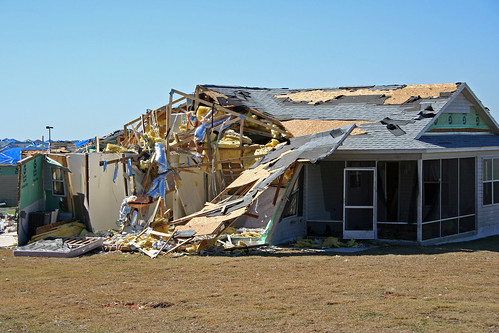The job of a landlord involves major responsibilities of managing multiple properties and housing units. Often, much of a landlord’s own money is tied up in the properties, and when a natural disaster hits it can be financially devastating. If landlords are caught unprepared and without insurance, the damage from fires, floods, tornadoes, hurricanes, mudslides, and earthquakes can be crippling.

Dangerous Flames
Fires that start by accident, from lightning strikes, or from out of control forest fires can spread through homes quickly. A landlord needs to be ever-vigilant and always have working sprinklers and smoke detectors. According to the Federal Emergency Management Agency, every year home fires cause more than $7.3 billion in direct property loss.
Water Destruction
Massive floods from a natural disaster can totally demolish rental property. Even if the building are still standing after the floodwaters subside, landlords still lose money because the units can’t be rented out without extensive renovations and repairs.
Proactively purchasing flood insurance for properties in floodplain areas is a smart way to protect against a worst-case scenario. If the homes are swept away, landlords can apply for federal aid to help them rebuild and make sure the new structures are built to withstand any future flooding.
Destruction From the Skies
Tornadoes and hurricanes are a landlord’s worst enemy. Whether it’s the swirling high winds of a tornado or the straight-line winds of a hurricane, these high winds can tear an apartment into shreds. Tornadoes can revolve at speeds of up to 500 mph, rip the roof off a building, and destroy it in a few seconds. Tropical hurricanes can blow through at up to 74 mph.
Tornadoes and hurricanes can combine, making the damage worse and causing flooding. Hurricanes can hit rental housing near the coastline hard, making thousands of renters homeless. Tornadoes touching down inland can have the same effect.
A Muddy Mess
Mudslides and landslides are just as deadly, and residential housing near a disaster like this is in a high-risk area. Unless renters are evacuated quickly, loss of life can occur on top of property damage and destruction. In a worst-case scenario, property located near a mountain can quickly be buried after heavy rains.
Crumbling Ground
Earthquakes can be another nightmare for landlords. When they hit rental housing, they can cause massive property damage and sometimes loss of life. In cities and highly-populated areas, the danger is even greater when apartment communities are built in close proximity to each other. Some areas are more prone to earthquakes because of fault lines in the earth.
Managing rental property can be a profitable venture, but the job also requires planning for disasters with an eye towards awareness and prevention. The best strategy is to be prepared with proper insurance.
Deborah Reese is a freelance blogger who writes useful advice for landlords. This cheap landlord insurance guide can help you find insurance to protect your properties from disaster. To learn more, click here.
